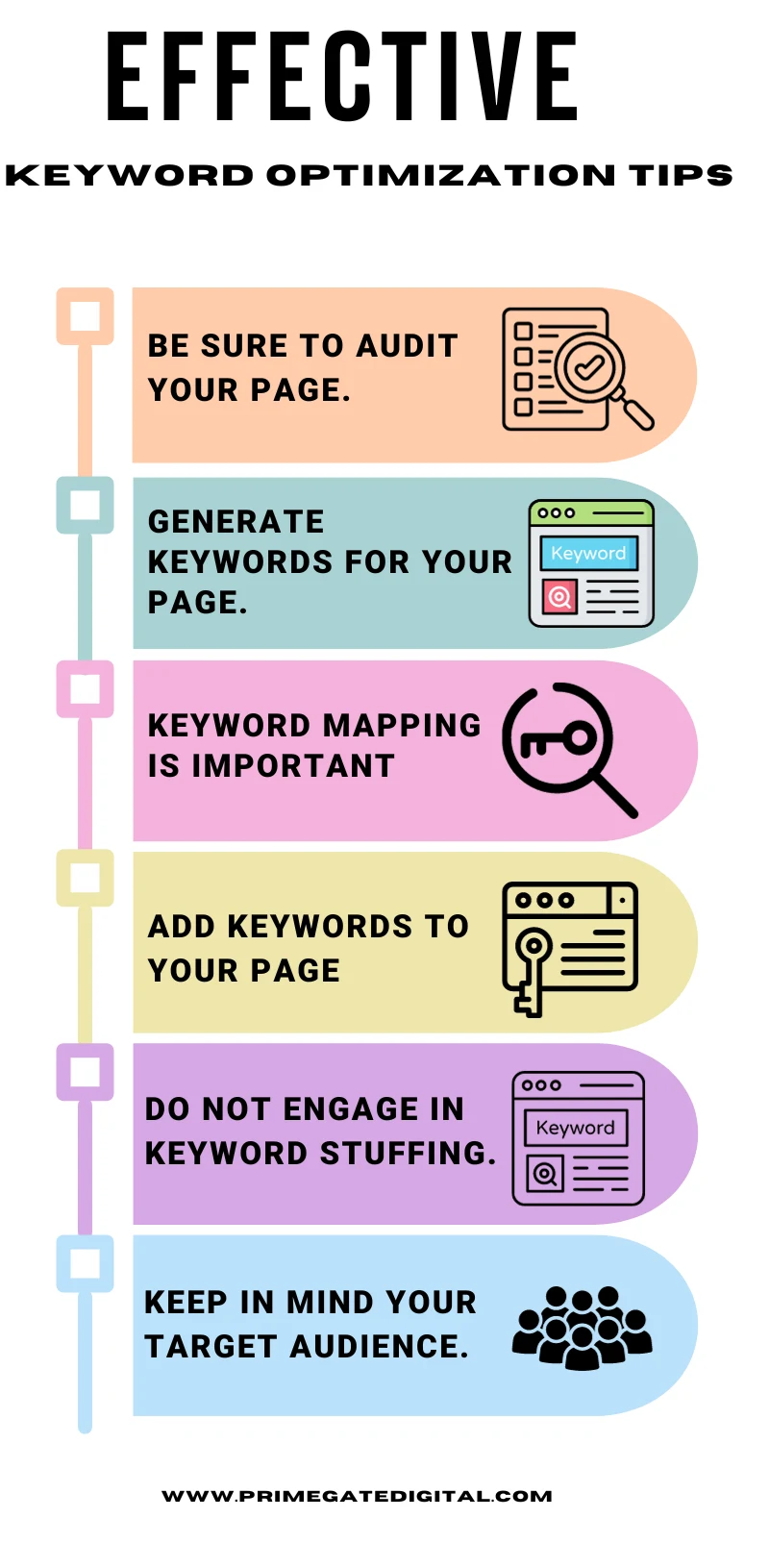Last updated on December 10th, 2023 at 07:33 pm
Keyword optimization is a great way to drive traffic and improve your ranking. Keywords are phrases or words that users input into Google and other search engine websites to seek information, services, and products.
A good way to generate keywords is through adequate keyword research.

By keyword research, I mean the use of various strategies and tools to find the information your target audience seeks on social media. It is also a way of analyzing the competitiveness of those keywords and whether they align with your content and goals.
What is keyword optimization?
As a website owner or SEO professional, you have to carry out keyword optimization to make sure that your targeted keywords are good for improving your site traffic and ensuring your site has the ideal site rank so people can discover it without hassle.
An optimized keyword will signal to search engine algorithms that your page meets the needs of searchers and should have a good ranking for search queries.
Keyword optimization has to be carried out regularly for some pages. It is possible that you have to refine your keyword strategy to meet the evolving nature of certain search queries.
How do you optimize keywords for SEO?
Keyword optimization may seem daunting, particularly if you are an SEO newbie. It might sound confusing. As we define it, one way to get accurate keywords is to enable your page to rank for a search query.
Site owners have their own unique strategy for this activity. There are plenty of free keyword tools you can use. For instance, there are Google AdWords, Ahrefs generator tool and Answer the Public.
These tools assist you in planning your keywords and creating a list that revolves around your keyword rank, which means you have a rich diversity of keywords available.
These tools are also good for finding data and analytics for individual keywords. This will help you make an informed decision and identify the most ideal keyword for your page content.

Effective Keyword Optimization Tips
Having a good keyword optimization strategy can add tremendous value to your SEO and improve your page content rank. This can contribute to better traffic, customer acquisition, and lead generation.
Here are some factors you need to consider when optimizing your keywords in your content:
- Be sure to audit your page.
- Generate keywords for your page.
- Keyword mapping is important
- Add keywords to your page
- Do not engage in keyword stuffing.
- Keep in mind your target audience.
Be sure to audit your page.
Before anything else, you have to review your SEO tactics by carrying out an audit. You should pay attention to these factors when auditing:
Title tags: These inform Google about the central idea of your page content. Keep them unique and their length reasonable (around 55 characters).
Meta Description: These serve as a brief overview (around 120 characters) that appears underneath your page in search results pages. The meta description has to be short and describe, in accurate terms, the content of your page.
Header tags: Make sure your page has the right organization for subheadings and headings. This is better than just bolding regular text. Search engines pay attention to text in header tags when finding out the content of your website.
URL structure: You should have a short URL structure. Ensure you add your keywords to it.
Images: Avoid using random names for your image files and alt text. Search algorithms pay attention to them when ranking your page. They are also perfect for improving your site accessibility. Make sure that your alt text has some relationship to your content.
The content: Check whether it is relevant or if you can refine or improve it further. It should be a minimum of 500 words. If your page content is of good quality, it will have a better rank.
Check links: Your page content should have a robust link structure. It is important that you have quality external and internal links to your content. Make sure your anchor text is relevant.
Social media: If branding is an essential aspect of your site, make sure that your social media profiles are added to your page.
After properly auditing your page and SEO tactics, the next step will be to concentrate on your keywords.
Generate keywords for your page.
Try keyword research through the use of keyword research tools. The research has to be comprehensive, taking into consideration the search volume, authority, relevance, and difficulty of the keyword.
You can start by coming up with a keyword and search query list that have relevance to your content. Then, you can review them by inputting them into the tool.
Pay attention to the statistics or data each keyword has. Does it have a high search volume? What is the competition level? By using a keyword research tool, you can discover if the keyword is right for your content.
Keyword mapping is important
Keyword mapping is a tactic that you can easily use on your site. After brainstorming about your keywords and checking out their relevance to your site content, be sure to do research on them, then map the page where your keywords should be positioned.
The reason keyword mapping is important is that it helps you analyze the best place to add your keyword. This reduces the likelihood of stuffing keywords on the home page.
Your page content should serve as a guide, helping you determine the best place to position your keywords. You have to decide what makes your page stand out and consider this when placing your keyword.
Also, it is a smart idea to check for keywords with semantic relationships. You can check Google Related Search (in the bottom left corner of the search page) for this. You can add this to the page if you want to rank for similar keywords on SERPs (search engine results pages).
Add keywords to your page
After selecting your keywords and deciding their placement, you have to add them to your content or amend your content to suit them.
This is easy for some keywords.
Let’s assume you have blog content on electric bikes and you wish to place the keyword phrase “best electrical bike in NYC.” It may be as straightforward as amending header 2 from “which electric bike is good for NYC” to “the best electric bike in NYC.”
However, there are some cases where adding certain keywords to your content can change the sentence structure, which is what we will address in the next tip.
Do not engage in keyword stuffing.
Keyword stuffing is a technique where keywords are added to content to manipulate search engine ranking. This could risk a penalty from Google.
While keywords are helpful for improving your site rankings, when you use them at a high frequency and the content is of low quality, it can negatively impact your SEO.
Search engine algorithms are now sophisticated enough to detect keyword stuffing and won’t reward pages with stuffed keywords since their content is generally low quality.
The goal of the Google search algorithm is to show users helpful and quality content.
Thus, the quality of your content should matter more than the frequency of keywords.
Keep your target audience in mind.
Your target audience is crucial to the keyword optimization process.
Let’s assume you have invested time and resources in page optimization so it ranks on the first page, and you find that people who look for the search phrase in your content are interested in a different thing entirely.
When you do not pay attention to your target audience, it can lead to two eventualities:
- A lot of people who aren’t interested in your products, services, or business offerings discover your page and leave immediately when they don’t find what they need. This will increase your bounce rate and negatively impact your page experience.
- Your site won’t be accessed by your target audience in the search results.
We advise that you get rid of keywords that aren’t bringing in the right audience for your website and add search terms that align with the needs of your target audience.
FAQ
How do I find out if my page is optimized?
The simplest way to check if your page is well-optimized for search engines is to perform a search audit.
Check your meta descriptions, headers, and title tags.
You have to add your primary keyword to those areas if you want your page to have a high rank in SERPs.
How do I rank my first page on Google?
- Effectively use long-tail keywords.
- Try different content structures.
- Organize your content properly with headers.
- Pay attention to the user experience.
- Carry out competitor analysis
- Improve your page speed.
- Ensure you acquire quality backlinks.
How do I optimize my SEO?
- Ensure your content is helpful and value-driven
- Create content that caters to the search intent of readers.
- Align your content with Google’s E-E-A-T guidelines.
- Position your website to cultivate trustworthiness.
- Limit the ads on your website.
- Create a proper link structure.
Conclusion
If you are new to SEO, keyword optimization may seem challenging. The good news is that it is a fairly straightforward process. In this article, we share tips to help you get the most out of the keyword optimization process.
 PrimeGate Digital is a Result Driven Blog that strives to go beyond ‘Conventional Digital Marketing’ through digital innovation and performance marketing. We have experience working with world class brands and products.
PrimeGate Digital is a Result Driven Blog that strives to go beyond ‘Conventional Digital Marketing’ through digital innovation and performance marketing. We have experience working with world class brands and products.

